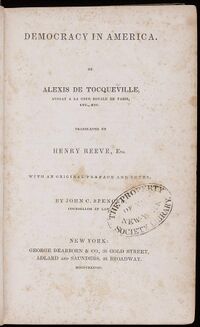Mutual liberty
Topic: Philosophy
 From HandWiki - Reading time: 1 min
From HandWiki - Reading time: 1 min
Mutual liberty is an idea first developed by Alexis de Tocqueville in his 1835 work Democracy in America.[1] He referred to the general nature of United States society during the 19th century. It appeared to him, on the surface, that every citizen had the opportunity to participate in the country's civic activities.
John Stuart Mill expanded the notion. He posited that the most proper occasion for mutual liberty was in a community governed by the consent of the governed and argued that only in a republic may members of all political factions participate.[2]
References
External links
- John Stuart Mill in the Stanford Encyclopedia of Philosophy
- In Search of Tocqueville's Democracy in America, information and resources about Alexis de Tocqueville.
 |
Licensed under CC BY-SA 3.0 | Source: https://handwiki.org/wiki/Philosophy:Mutual_liberty15 views | Status: cached on February 23 2024 09:47:12↧ Download this article as ZWI file
 KSF
KSF
